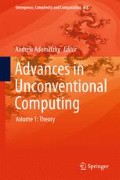Abstract
Kolmogorov or algorithmic complexity has found applications in many areas including medicine, biology, neurophysiology, physics, economics, hardware and software engineering. Conventional Kolmogorov/algorithmic complexity and its modifications are based on application of conventional, i.e., recursive, algorithms, such as Turing machines. Inductive complexity studied in this paper is based on application of unconventional algorithms such as inductive Turing machines, which are super-recursive as they can compute much more than recursive algorithm can. It is possible to apply inductive complexity in all cases where Kolmogorov complexity is used. In particular, inductive complexity has been used in the study of mathematical problem complexity. The main goal of this work is to show how inductive algorithms can reduce complexity of programs and problems. In Sect. 8.2, we build the constructive hierarchy of inductive Turing machines and study the corresponding hierarchy of inductively computable functions. Inductive Turing machines from the constructive hierarchy are very powerful because they can build (compute) the whole arithmetical hierarchy. In Sect. 8.3, it is proved that inductive algorithms from the constructive hierarchy can essentially reduce complexity of programs and problems and the more powerful inductive algorithms are utilized the larger reduction of complexity is achievable.
Access this chapter
Tax calculation will be finalised at checkout
Purchases are for personal use only
References
Benci, V., Bonanno, C., Galatolo, S., Menconi, G., Virgilio, M. Dynamical systems and computable information, Preprint in Physics cond-mat/0210654, 2002 (electronic edition: http://arXiv.org)
Blum, L., Shub, M., Smale, S.: On a theory of computation and complexity over the real numbers: NP-completeness, recursive functions and universal machines. Bull. Am. Math. Soc. 21(1), 1–46 (1989)
Burgin, M.S.: Inductive Turing machines. Not. Acad. Sci. USSR 27(3), 1289–1293 (1983)
Burgin, M.S.: Generalized Kolmogorov complexity and other dual complexity measures. Cybern. Syst. Anal. 26(4), 481–490 (1990)
Burgin, M.: Super-recursive algorithms as a tool for high performance computing. In: Proceedings of the High Performance Computing Symposium, pp. 224–228. San Diego (1999)
Burgin, M.: Nonlinear phenomena in spaces of algorithms. Int. J. Comput. Math. 80(12), 1449–1476 (2003)
Burgin, M.: Algorithmic complexity of recursive and inductive algorithms. Theor. Comput. Sci. 317(1/3), 31–60 (2004)
Burgin, M.: Superrecursive Algorithms. Springer, New York (2005)
Burgin, M. Superrecursive hierarchies of algorithmic problems. In: Proceedings of the 2005 International Conference on Foundations of Computer Science, pp. 31–37. CSREA Press, Las Vegas (2005)
Burgin, M.: Algorithmic complexity as a criterion of insolvability. Theor. Comput. Sci. 383(2/3), 244–259 (2007)
Burgin, M.: Algorithmic complexity of computational problems. Int. J. Comput. Inf. Technol. 2(1), 149–187 (2010)
Burgin, M.: Measuring Power of Algorithms, Computer Programs, and Information Automata. Nova Science Publishers, New York (2010)
Burgin, M., Calude, C.S., Calude, E.: Inductive Complexity Measures for Mathematical Problems. CDMTCS Research, Report 416 (2011)
Burgin, M., Debnath, N.C.: Complexity of algorithms and software metrics. In: Proceedings of the ISCA 18th International Conference “Computers and their Applications, pp. 259–262. International Society for Computers and their Applications, Honolulu, Hawaii (2003)
Calude, C.S., Calude, E., Queen, M.S.: Inductive complexity of P versus NP Problem. Unconv. Comput. Nat. Comput. Lect. Notes Comput. Sci. 7445, 2–9 (2012)
Crosby, S.A., Wallach, D.S.: Denial of Service via Algorithmic Complexity Attacks, Technical Report TR-03-416. Department of Computer Science, Rice University (2003)
Debnath, N.C., Burgin, M.: Software metrics from the algorithmic perspective. In: Proceedings of the ISCA 18th International Conference “Computers and their Applications”, pp. 279–282. Honolulu, Hawaii (2003)
Dewey, T.G.: The algorithmic complexity of a protein. Phys. Rev. E 54, R39–R41 (1996)
Dewey, T.G.: Algorithmic complexity and thermodynamics of sequence: structure relationships in proteins. Phys. Rev. E 56, 4545–4552 (1997)
Dzhunushaliev, V.D.: Kolmogorov’s algorithmic complexity and its probability interpretation in quantum gravity. Class. Quantum Gravity 15, 603–612 (1998)
Dzhunushaliev, V.D., Singleton, D.: Algorithmic Complexity in Cosmology and Quantum Gravity, Preprint in Physics gr-qc/0108038, 2001 (electronic edition: http://arXiv.org)
Hertel, J.: Inductive complexity of Goodstein’s theorem. Unconv. Comput. Nat. Comput. Lect. Notes Comput. Sci. 7445, 141–151 (2012)
Kolmogorov, A.N.: Three approaches to the definition of the quantity of information. Probl. Inf. Trans. 1, 3–11 (1965)
Kreinovich, V., Kunin, I.A.: Application of Kolmogorov Complexity to Advanced Problems in Mechanics, University of Texas at El Paso, Computer Science Department Reports, UTEP-CS-04-14 (2004)
Lewis, J.P.: Limits to software estimation. Softw. Eng. Notes 26, 54–59 (2001)
Li, M., Vitanyi, P.: An Introduction to Kolmogorov Complexity and its Applications. Springer, New York (1997)
Mansilla, R.: Algorithmic Complexity in Real Financial Markets, Preprint in Physics cond-mat/0104472 (2001) (electronic edition: http://arXiv.org)
Shaw, F.Z., Chen, R.F., Tsao, H.W., Yen, C.T.: Algorithmic complexity as an index of cortical function in awake and pentobarbital-anesthetized rats. J. Neurosci. Methods 93(2), 101–110 (1999)
Tegmark, M.: Does the universe in fact contain almost no information? Found. Phys. Lett. 9, 25–42 (1996)
Vitanyi, P.M.B.: Quantum Kolmogorov complexity based on classical descriptions. IEEE Trans. Inf. Theory 47(6), 2464–2479 (2001)
Zimbardo, P.G., Weber, A.L., Jonson, R.L.: Psychology. Allyn and Bacon, San Francisco (2003)
Zurek, W.H.: Algorithmic randomness and physical entropy. Phys. Rev. A (3) 40(8), 4731–4751 (1989)
Zurek, W.H.: Algorithmic information content, Church-Turing thesis, physical entropy, and Maxwell’s demon. Information dynamics (Irsee, 1990): NATO Adv. Sci. Inst. Ser. B Phys., 256. Plenum, New York, 245–259 (1991)
Author information
Authors and Affiliations
Corresponding author
Editor information
Editors and Affiliations
Rights and permissions
Copyright information
© 2017 Springer International Publishing Switzerland
About this chapter
Cite this chapter
Burgin, M. (2017). Decreasing Complexity in Inductive Computations. In: Adamatzky, A. (eds) Advances in Unconventional Computing. Emergence, Complexity and Computation, vol 22. Springer, Cham. https://doi.org/10.1007/978-3-319-33924-5_8
Download citation
DOI: https://doi.org/10.1007/978-3-319-33924-5_8
Published:
Publisher Name: Springer, Cham
Print ISBN: 978-3-319-33923-8
Online ISBN: 978-3-319-33924-5
eBook Packages: EngineeringEngineering (R0)

